
Hybrid Forum: Transitioning to Sustainable and Resilient Energy Systems in Developing Economies .
Event | September 12, 2023
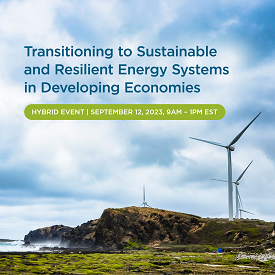
On September 12, Chemonics and EPRI convened industry experts to discuss sustainable strategies for transitioning to sustainable energy.
The transition to energy systems powered principally by renewable sources requires a fundamental shift in the production, distribution, and consumption of energy, while protecting the welfare of workers and communities whose livelihoods have depended on conventional energy systems (the just transition). This must be achieved in the context of a changing climate, the impacts of which threaten energy security, livelihoods, and populations of emerging market economies, all without compromising the ability of future generations to meet their own needs. The ability of the global community to achieve a just transition to a sustainable energy future is central to avoiding the effects of climate change far worse than those already observed today.
Chemonics’ Sustainable Energy Transition team partnered with the Electric Power Research Institute (EPRI) to host a hybrid forum on Transitioning to Sustainable and Resilient Energy Systems in Developing Economies. The event examined successful strategies in transitioning to sustainable energy and included a keynote address delivered by EPRI’s President and CEO, Arshad Mansoor, as well as a panel discussion with distinguished industry experts from USAID, Millennium Challenge Corporation, EPRI, Johns Hopkins University School of Advanced International Studies, and Chemonics.
Opening Remarks
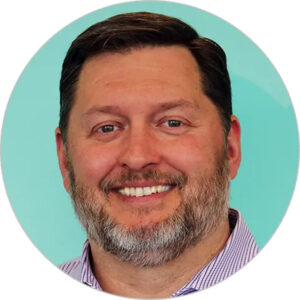
Jamey Butcher, president and chief executive officer, Chemonics International
Since joining Chemonics in 1998, president and CEO, Jamey Butcher has served across a variety of roles and regions. Most recently, Jamey oversaw Chemonics’ global health and supply chain portfolio. In that capacity, he led efforts to implement sustainable supply chains, improve health service delivery, and scale up innovative approaches in developing country environments. Jamey draws from experience as a private sector development specialist with more than 20 years of experience in Eurasia, Latin America, and Asia. He has conducted technical assignments on international trade, competitiveness, and micro-, small, and medium enterprise development. Jamey received an M.A. from American University in international political economy and a B.A. in political science from Colorado State University.
Keynote Speaker and Panelist
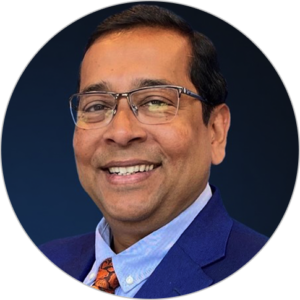
Arshad Mansoor, president and chief executive officer, EPRI
Arshad Mansoor is responsible for EPRI’s operation and its global portfolio of R&D and demonstration programs, spanning all sources of generation, power delivery and utilization, and the environment.
Arshad holds five U.S. patents in power electronics and distributed energy resources. He is a senior member of the Institute of Electrical and Electronics Engineers, previously served as vice president of the U.S. National Committee of CIGRE, the international council on large electric systems, and as a member of the board for the Energy Production and Infrastructure Center (EPIC) at the University of North Carolina, Charlotte. He has published numerous papers in journals and conference proceedings and has given talks and participated in panels at leading technical forums worldwide.
Arshad earned a Bachelor of Science in electrical engineering from the Bangladesh University of Engineering and Technology. He earned his Master of Science (1992) and doctorate (1994) in electrical engineering, focusing on power systems engineering from the University of Texas in Austin. He completed the MIT Reactor Technology Course and the Harvard Business School Advanced Management Program.
Panelists
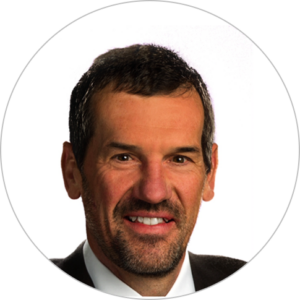
Neil Wilmshurst, senior vice president, energy system resources and chief nuclear officer, EPRI
Neil Wilmshurst has overall management and technical responsibility for the research and development activities conducted by EPRI with its global membership related to all generation sources and storage. Before joining EPRI, Neil worked in a variety of nuclear utility engineering and maintenance roles with AmerGen at Three Mile Island Unit 1 and British Energy at the Sizewell B plant. Prior to joining the civil nuclear program, he served for 13 years in the Royal Navy as a nuclear submarine engineer officer. He has been on a nuclear site in every continent that has a nuclear plant.
Neil earned a bachelor’s degree in electrical, mechanical, and control engineering from the Royal Naval Engineering College, Manadon, UK; a postgraduate diploma in nuclear reactor technology from the Royal Naval College, Greenwich, UK; and a master’s degree in defense administration from Cranfield Institute of Technology, Shrivenham, UK.

Anna Broughel, Sustainable Energy Transition Policy lecturer, Johns Hopkins University School of Advanced International Studies
Anna is a lecturer in Sustainable Energy Transition Policy at Johns Hopkins University School of Advanced International Studies (SAIS). She previously served as the director at the Clean Energy Leadership Institute (CELI), energy economist and statistician at Tetra Tech, and an ORISE Fellow at the Solar Energy Technologies Office (SETO) at the U.S. Department of Energy. As a member of the executive council of the United States Association for Energy Economics (USAEE), Anna holds the position of vice president of communications at the USAEE and oversees the USAEE/IAEE annual conference plenaries. She holds BAs in Economics and Linguistics, an MA in International Economics, and a Ph.D. in Economics, Policy, and Human Dimensions, which she received as part of her Fulbright studies. She completed post-doctoral training at the University of St. Gallen and at the University of Maryland College Park.

Jacqueline Musiitwa, senior climate finance advisor, USAID
Jacqueline is a Biden-Harris appointed Senior Climate Finance Advisor at USAID and an international attorney and sustainability advisor. Concurrently, she teaches at Georgetown University as an adjunct professor and holds a Fellowship with the Atlantic Council in the Africa Center. Jacqueline previously served in executive roles at Rio Tinto, Trade and Development Bank and non executive roles at Persistent Energy and ARCH Africa Renewable Power Fund. She holds a JD as well as BAs in Political Science and International Studies.
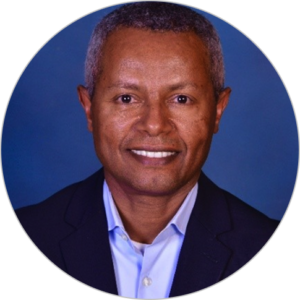
Nebiyou Girma, practice lead and senior director, Millennium Challenge Corporation
Neb is a practice lead and senior director at the Millennium Challenge Corporation. He previously served as the senior regional energy sector advisor for the USAID Power Africa East Africa Energy Program and as senior energy sector advisor for USAID Power Africa, Ethiopia. Neb additionally served as vice president of government services, lead transaction advisor, and country director in Ethiopia, for Nexant Inc. He holds a bachelor’s degree in Electrical and Electronics Engineering as well as an MBA in Finance.
Moderator
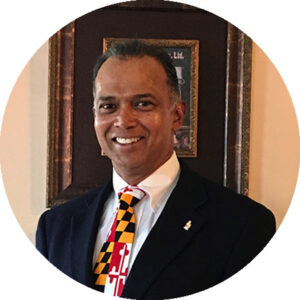
Matthew Mendis, managing director, Energy, Chemonics International
Matthew S. Mendis is a clean energy, environment, and finance expert with more than 35 years of experience in more than 45 developing countries. Matthew spent 10 years of his career at the World Bank. Subsequently, he founded Alternative Energy, Development, Inc., then merged it with International Resources Group (IRG/Engility), where he was corporate vice president for the Energy & Environmental Management Division. He also served as a senior consultant and program manager for the Asian Development Bank (ADB) on their Asia Least-Cost Greenhouse Gas Abatement Strategy Program. From 2008 to 2012, Matthew served as president and managing director for C-Quest Capital, a carbon finance and clean energy investment group. Subsequently, he was senior vice president for Nexant’s Government Services Business Unit. He is a member of the Board of Advisors of Sunwealth LLC, a clean energy investment fund. Matthew holds an M.A. in Natural Resources Economics and a B.Sc. in Environmental Engineering from the University of Maryland (UMD).
Master of Ceremonies
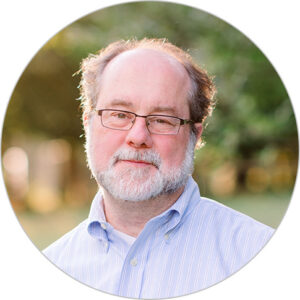
Edward Hoyt, director, Energy, Chemonics International
Edward Hoyt is a senior global practice lead in the Asia Division, member of the Chemonics Energy Group, and a director of the Water, Energy and Sustainable Cities Practice, responsible for technical leadership on energy. Prior to joining Chemonics, Edward was a principal consultant with Abt Associates and Nexant, and earlier was a co-founder of Econergy, a diversified clean energy company publicly traded on London’s Alternative Investment Market. He is an economist with more than 25 years of experience in energy and development, including leadership roles on USAID programs in Central America and West Africa supporting investment in clean energy businesses and projects. He has worked in over 50 countries in Latin America, Africa, the Middle East, Europe and Asia. Edward holds a Master of Arts in Law and Diplomacy in international environmental policy and economic development from Tufts University’s Fletcher School of Law and Diplomacy and a BA in political economy from the University of Pennsylvania.
Agenda
9:00 a.m. – 10:00 a.m. – Registration
10:00 a.m. – 10:10 a.m. – Opening remarks – Edward Hoyt, Matthew Mendis, and Jamey Butcher
10:10 a.m. – 10:30 a.m. – Keynote address: What Do We Mean by the “Sustainable Energy Transition in the Developing World”? – Arshad Mansoor
10:30 am. – 12:00 p.m. – Panel discussion: How to Achieve the Sustainable Energy Transition in a Developing Economy
12:00 p.m. – 1:00 p.m. – Lunch
